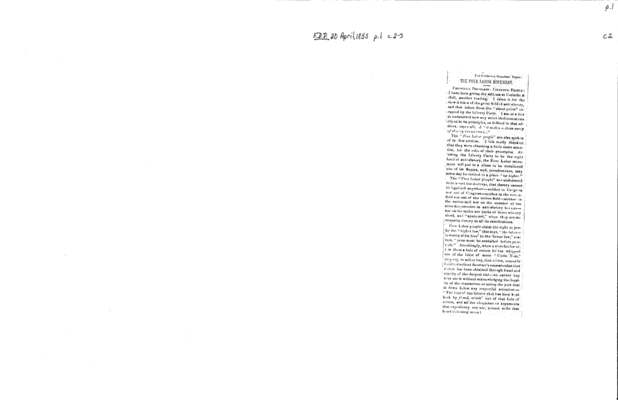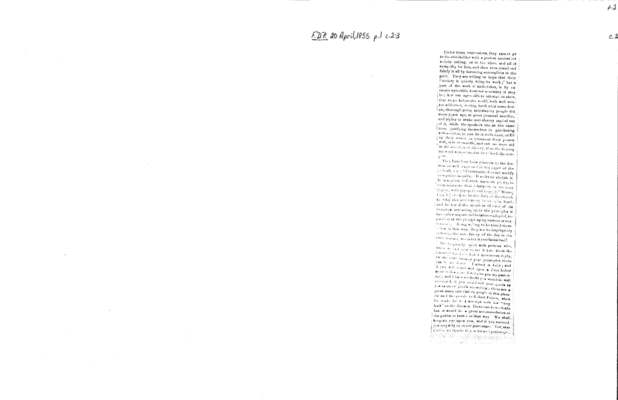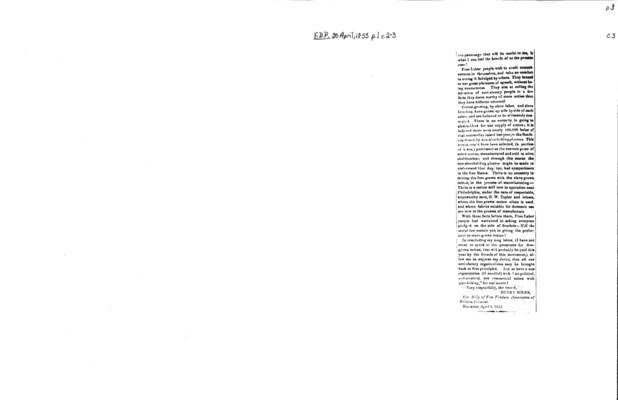Pages
D6756_Page_1
For Frederick Douglass'Paper.
THE FREE LABOR MOVEMENT.
FREDERICK DOUGLASS: ESTEEMED FRIEND: I have been giving thy address at Corinthian Hall, another reading, I value it for the view it takes of the great field of anti slavery, and that taken from the "stand point" occupied by the Liberty Party. I am at a loss to understand how any strict abolitionist can object to its principles, as defined in that address, especially if " it makes a clean sweep of slavery EVERYWHERE."
The "Free Labor people" are also spoken of in that address, I felt really thankful that they were obtaining a little more attention, for the for the sake of their principles. Allknowing the Liberty Party to be the right hand of anti slavery, the Free Labor movement will put in a claim to be considered one of its fingers, and, peradventure may someday be invited to a place "up higher."
The "Free Labor people" are understood to reassert the doctirine, that slavery cannot be legalized anywhere--neither in Congress nor out of Congress--neither in the cottonfield nor out of the cotton field--neither in the cotton-mill nor on the counter of the-- store-keeper--nor in the anti-slavery bizaars-- nor on the tables nor backs of those who cry aloud, and "spare not," when they are donouncing slavery in all its ramifications.
Free Labor people claim the right to prefer the "higher law," that says, "the laborer is worthy of his hire" to the "lower law," that says, "price must be consulted before principle." Accordingly, when a slaveholder offers them a bale of cotton he has whipped out of the labor of some "Uncle Tom," they say, to sell or buy, that cotton, cannot be legalized without the owner's consent--that that cotten has been obtained through fraud and cruelty of the deepest tint--we cannot buy it or use it without acknowledging the legallity of the transaction or acting the part that is down below any respectful attention.-- "The hire of the laborer that has been kept back by fraud, crieth" out of that bale of cotton, and all the eloquence or arguments that expediency can use, cannot stifile that heart-sickening moan!
D6756_Page_2
Under these impressions, they cannot go to the slaveholder with a protest against his unholy calling, or to the slave, and affect sympathy for him, and then turn round and falseify it all by becoming accomplices in the guilt. They are willing to hope that their "society is quietly doing its work;" but a part of the work it undertakes, is by no means agreeable, however necessary it may be; it is not agreeable to show, that to go before the world, with well written addresses, setting forth what some honest, thorough-going anti-slavery people did some years ago, at great personal sacrifice, and trying to make anti-slavery capital out of it, while the speakers are, at the same time, justifying themselves in purchasing stolen cotton, to run their mills upon, or fill up their stores, or ornament their person with, is mere twaddle, and can no more aid in the abolition of slavery than the beating the wind with a fan, can drive back the tempest.
They have long converts to the doctrine to well exposed in thy paper of the 30th ult, viz: "Christianity does not modify or regulate iniquity. It seeks to abolish it. It is a gross reflection upon its iniquity, to even insinuate that it tampers in the least degree, "with any species of iniquity." Hence, they believe it to be the duty of the church to take the anti slavery [illegable] hand, and to see if the members of each of its branches are acting up to the principles it has--after mature deliberation--adopted, regardless of the plea set up by custom or con[illegable]. Bring willing to be tested themselves in this way, they see no impropriety in testing the anti-slavery of the day in the same manner, whatever it proclaims itself.
We frequently meet with persons who, when we [illegable][illegable] to set before them the claims of the free labor movement, reply. Of the connectors of your principles, there can be no doubt, I admit it fully; and if you will come and open a Free Labor store in the place, I will give you my patronage; and I have no doubt you would be well sustianed, if you could sell your goods as low as other goods are selling; there are a great many anti-slavery people in this place so said the people to Robert Fulton, when he made his first attempt with his "tiny bark" on the Hudson. There can be no doubt but it would be a great accommodation to the public to travel in that way. We shall keep an eye upon you, and if you succeed, you may rely upon our patronage. But, says Fulton no thanks to you for such patornage;
D6756_Page_3
the patronage that will be useful to me, is what I can feel the benefits of at the present time!
Free Labor people wish to avoid censoriousness in themselves, and take no comfort in seeing it indulged by others. They intend to use great plainess of speech, without being uncourteous. They aim at calling the attention of anti-slavery peopel to a few facts they deem worthy of more notice than they have hitherto obtained.
Cotton growing, by slave labor, and slave breeding, have grown up side by side of each other, and are believed to be ultimately connected. There is no necessity in going to slaveholders for our supply of cotton; it is believed there were nearly 100,00 bales of that commodity raised last year, in the Southern States, by non slaveholding planters. This cotton might have been selected, (a portion of it was) purchased at the current price of other cotton, manfactured and sold to ultra abolistionists; and through this means the non-slaveholding planter might be made to understand that they too, had sympathisers in the free States. There is necessity in mixing the free grown with the slave-grown cotton, in the process of manufacturing.-- There is a cotton mill now in operation near Philadelphia, under the care of respectable, trustworthy men, G. W. Taylor and others, where the free grown cotton alone is used. and where fabrics suitable for domestic use are now in the process of manufacture.
With these facts before them, Free Labor people feel warranted in asking everyone pledged on the side of freedom--Will the moral law sustain you in giving the perference to slave-grown cotton?
In concluding my long letter, (I have not room to speak of the premiums for freegrown cotton that will probably be paid this year by the friends of this movement,) allow me to express my desire, that all our anti-slavery organizations may be brought back to the first principles. Let us have a new organization (if needful) with "no political, ecslesiastical, nor commercial union with slaveholding," for our motto!
Very respectfully, thy friend, HENRY MILES Cor Sec'y of Free Produce Association of Western Vermont. MOCKTON, April 5, 1855.


